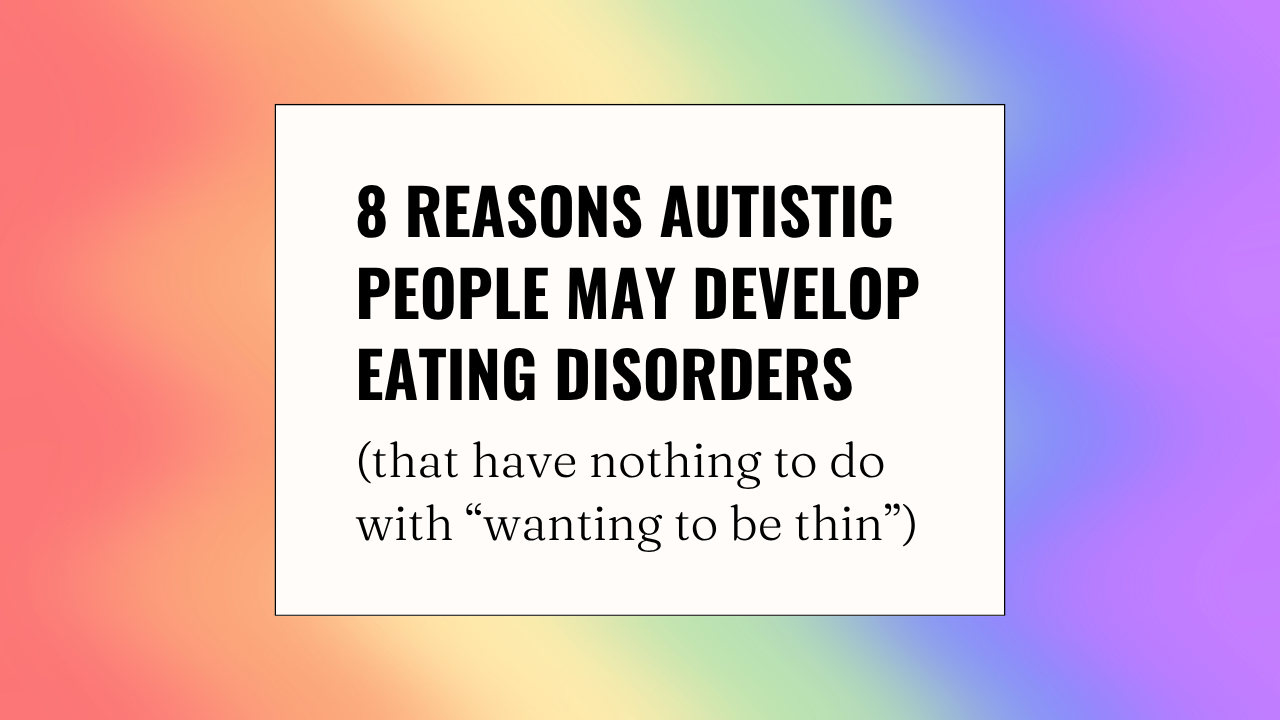8 reasons autistic people may develop eating disorders
Aug 07, 2025
As an autistic person, my anorexia was never about “wanting to be thin.” In this post, you’ll learn 8 reasons why autistic people may develop eating disorders!
1. Sensory Sensitivities
Autistic people are more likely to be hypersensitive or hyposensitive to certain stimuli. Food-avoidance behaviors can lead to restrictive eating disorders such as anorexia and ARFID while eating to stim can lead to overeating and binge eating.
2. Interoceptive Difficulties
Neurodivergent people often lack interoceptive awareness, which helps us interpret the inner state of our bodies. Difficulty with interoception can result in unawareness of when we are hungry, full, thirsty, tired, overstretched, etc. Interoception is closely related to alexithymia, which is a difficulty describing emotions.
3. Nervous System Dysregulation
Being neurodivergent in a neurotypical world is often experienced as highly traumatic. Social norms you cannot comprehend, shallow people that cannot get on your philosophical level, and lack of accommodations creates a constant state of fight-or-flight mode. ED behaviors can serve as the “escape hatch” from this overwhelm.
4. Dysautonomia
Linked to nervous system dysregulation, dysautonomia is defined as a condition where the autonomic nervous system (ANS) “malfunctions,” leading to a wide range of symptoms, including GI issues, dizziness, fainting, rapid or slow heart rate, fatigue, nausea, brain fog, and much more. Many of my clients have shared that engaging with the ED lessens their symptoms.
5. Existential Angst
I have yet to meet a neurodivergent person that doesn’t think deeply. For as long as I can remember, I was asking the deep questions, from “Why am I here?” to “What’s the purpose of this life?” I always have to know why and am constantly questioning everything. Obviously, this kind of thinking is exhausting. The ED can numb you from the existential angst by creating a false sense of purpose.
6. Black & White Thinking
Black-and-white thinking is often labeled as “rigid thinking” and is sought to be fought. However, just as I like to view autistic behaviors as adaptive behaviors and eating “disorders” as an adaptive eating spectrum, I like to view black & white thinking as protective thinking. By seeing the world in “all or nothing,” you don’t have to confront the infinite possibilities of the colorful nuance.
7. Masking
I don’t know about you, but I cannot conform for the life of me! But when you’re growing up (undiagnosed) autistic and don’t know why you feel so different, you start to feel incredibly lonely. You mask in an attempt to hide your true self – which is obviously not sustainable. The ED can be a way to conform (everyone else is on a diet too!) while also being an “escape hatch” from the constant exhaustion of masking.
8. PDA
PDA, officially short for Pathological Demand Avoidance (I prefer the term Pervasive Drive for Autonomy), is a behavior profile where people go to extremes to ignore or avoid anything they perceive as a demand. Because eating can be perceived as a demand, neurodivergent people may avoid nourishing themselves. (And don’t even get me started on how ED treatment can trigger PDA, leading to labels including “defiant,” “manipulative,” “treatment-resistant,” etc...)
Want to discover neurodiversity-affirming strategies for ED recovery? Join the Autistically ED-Free Academy here!




